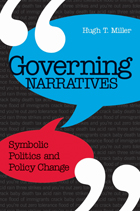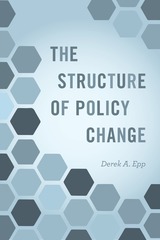

Michael Hayes offers a vigorous defense of incrementalism: the theory that the policymaking process typically should involve bargaining, delay, compromise, and, therefore, incremental change. Incrementalism, he argues, is one result of a checks-and-balances system in which politicians may disagree over what we want to achieve as a nation or what policies would best achieve shared goals.
Many political scientists have called for reforms that would facilitate majority rule and more radical policy change by strengthening the presidency at the expense of Congress. But Hayes develops policy typologies and analyzes case studies to show that the policy process works best when it conforms to the tenets of incrementalism. He contends that because humans are fallible, politics should work through social processes to achieve limited ends and to ameliorate—rather than completely solve—social problems. Analyzing the evolution of air pollution policy, the failure of President Clinton’s health care reform in 1994, and the successful effort at welfare reform in 1995-96, Hayes calls for changes that would make incrementalism work better by encouraging a more balanced struggle among social interests and by requiring political outcomes to conform to the rule of law.
Written for students and specialists in politics, public policy, and public administration, The Limits of Policy Change examines in detail a central issue in democratic theory.

During the 2008 election season, politicians from both sides of the aisle promised to rid government of lobbyists’ undue influence. For the authors of Lobbying and Policy Change, the most extensive study ever done on the topic, these promises ring hollow—not because politicians fail to keep them but because lobbies are far less influential than political rhetoric suggests.
Based on a comprehensive examination of ninety-eight issues, this volume demonstrates that sixty percent of recent lobbying campaigns failed to change policy despite millions of dollars spent trying. Why? The authors find that resources explain less than five percent of the difference between successful and unsuccessful efforts. Moreover, they show, these attempts must overcome an entrenched Washington system with a tremendous bias in favor of the status quo.
Though elected officials and existing policies carry more weight, lobbies have an impact too, and when advocates for a given issue finally succeed, policy tends to change significantly. The authors argue, however, that the lobbying community so strongly reflects elite interests that it will not fundamentally alter the balance of power unless its makeup shifts dramatically in favor of average Americans’ concerns.

For generations, debating the expansion or contraction of the American welfare state has produced some of the nation's most heated legislative battles. Attempting social policy reform is both risky and complicated, especially when it involves dealing with powerful vested interests, sharp ideological disagreements, and a nervous public.
The Politics of Policy Change compares and contrasts recent developments in three major federal policy areas in the United States: welfare, Medicare, and Social Security. Daniel Béland and Alex Waddan argue that we should pay close attention to the role of ideas when explaining the motivations for, and obstacles to, policy change.
This insightful book concentrates on three cases of social policy reform (or attempted reform) that took place during the presidencies of Bill Clinton and George W. Bush. Béland and Waddan further employ their framework to help explain the meaning of the 2010 health insurance reform and other developments that have taken place during the Obama presidency. The result is a book that will improve our understanding of the politics of policy change in contemporary federal politics.

Derek A. Epp argues that some agencies can indeed do that and that instability is at least partially a function of poor institutional design. While it is inherently more challenging to maintain stability around complex problems like immigration or climate change, the deliberative process itself can affect the degree of stability around an issue. Epp looks at whether agencies follow a deliberative model for decision making, in which policies are developed by means of debate among a small group of policymakers, or a collective model, in which the opinions of many people are aggregated, as with the stock market. He argues that, in many instances, the collective model produces more informed and stable policy outcomes that can be adapted more readily to new information and changing public priorities.
READERS
Browse our collection.
PUBLISHERS
See BiblioVault's publisher services.
STUDENT SERVICES
Files for college accessibility offices.
UChicago Accessibility Resources
home | accessibility | search | about | contact us
BiblioVault ® 2001 - 2025
The University of Chicago Press









